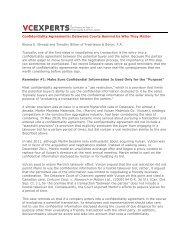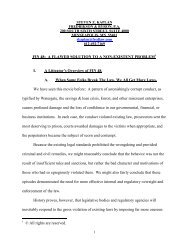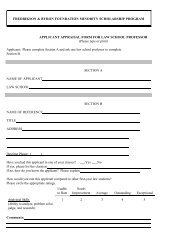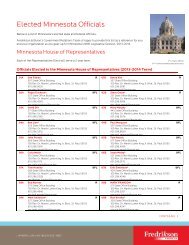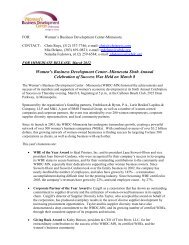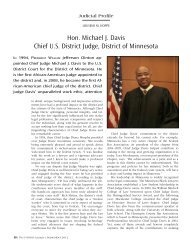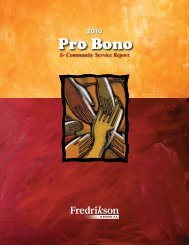Kivalina - Order Granting Motion to Dismiss for Lack of Jurisdiction
Kivalina - Order Granting Motion to Dismiss for Lack of Jurisdiction
Kivalina - Order Granting Motion to Dismiss for Lack of Jurisdiction
Create successful ePaper yourself
Turn your PDF publications into a flip-book with our unique Google optimized e-Paper software.
1<br />
2<br />
3<br />
4<br />
5<br />
6<br />
7<br />
8<br />
9<br />
10<br />
11<br />
12<br />
13<br />
14<br />
15<br />
16<br />
17<br />
18<br />
19<br />
20<br />
21<br />
22<br />
23<br />
24<br />
25<br />
26<br />
27<br />
28<br />
must dismiss the action.” Fed.R.Civ.P 12(h)(3). The instant motions present a facial challenge<br />
only.<br />
Case4:08-cv-01138-SBA Document194 Filed09/30/09 Page6 <strong>of</strong> 24<br />
III. DISCUSSION<br />
A. THE POLITICAL QUESTION DOCTRINE<br />
Federal courts are courts <strong>of</strong> limited jurisdiction. The power <strong>to</strong> hear a particular case is<br />
circumscribed by Article III <strong>of</strong> the Constitution, which extends federal judicial power only <strong>to</strong><br />
actual “Cases” and “Controversies.” U.S. Const., art. III, § 2, cl. 1. The Supreme Court “has<br />
recognized that the case-or-controversy limitation is crucial in maintaining the ‘tripartite<br />
allocation <strong>of</strong> power’ set <strong>for</strong>th in the Constitution.” DaimlerChrysler Corp. v. Cuno, 547 U.S.<br />
332, 341 (2006) (internal quotations omitted). Article III standing is thus a threshold<br />
requirement <strong>for</strong> federal court jurisdiction. Lujan v. Defenders <strong>of</strong> Wildlife, 504 U.S. 555, 559-<br />
60 (1992).<br />
“The Supreme Court has indicated that disputes involving political questions lie outside<br />
<strong>of</strong> the Article III jurisdiction <strong>of</strong> federal courts.” Corrie v. Caterpillar, Inc., 503 F.3d 974, 980<br />
(9th Cir. 2007) (citing cases); Summers v. Earth Island Inst., --- U.S. ---, 129 S.Ct. 1142, 1148<br />
(2009) (“courts have no charter <strong>to</strong> review and revise legislative and executive action”); Vieth v.<br />
Jubelirer, 541 U.S. 267, 277 (2004) (“the judicial department has no business entertaining the<br />
claim … because the question is entrusted <strong>to</strong> one <strong>of</strong> the political branches or involves no<br />
judicially en<strong>for</strong>ceable rights.”); see also United States v. Mandel, 914 F.2d 1215, 1222 (9th Cir.<br />
1990) (“certain political questions are by their nature committed <strong>to</strong> the political branches <strong>to</strong> the<br />
exclusion <strong>of</strong> the judiciary.”).<br />
The political question doctrine is a species <strong>of</strong> the separation <strong>of</strong> powers doctrine and<br />
provides that certain questions are political as opposed <strong>to</strong> legal, and thus, must be resolved by<br />
the political branches rather than by the judiciary. Corrie, 503 F.3d at 980. “The political<br />
question doctrine serves <strong>to</strong> prevent the federal courts from intruding unduly on certain policy<br />
choices and value judgments that are constitutionally committed <strong>to</strong> Congress or the executive<br />
branch.” Koohi v. United States, 976 F.2d 1328, 1331 (9th Cir. 1992). “A nonjusticiable<br />
political question exists when, <strong>to</strong> resolve a dispute, the court must make a policy judgment <strong>of</strong> a<br />
- 6 -



